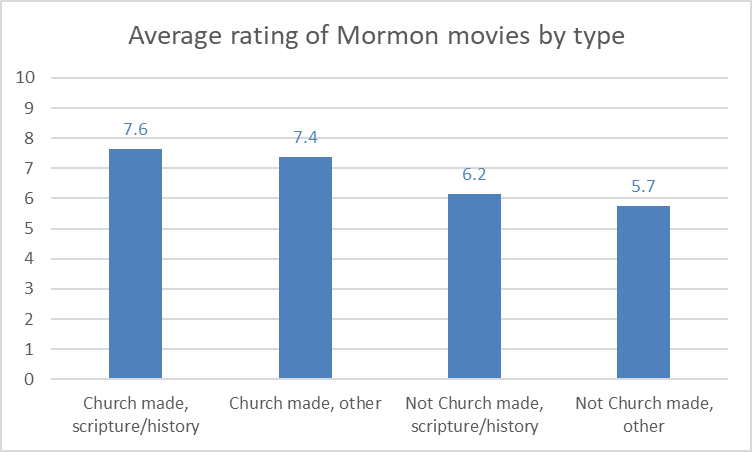After writing a silly post a few weeks ago with suggestions for movies the Church should make, I got to wondering how actual Mormon movies are rated on IMDB. I’m thinking here not just of Church-made movies, but of movies made about Mormons by non-Church studios, stuff like God’s Army or Saturday’s Warrior. I didn’t have any particular questions I wanted to answer with the data or any hypotheses to test. I just thought it might be interesting to look descriptively at what the ratings look like.
I got ratings from IMDB for a list of 75 Mormon movies. I made an initial list working from the following sources:
- Movies I have personally seen or am aware of
- Movies at least 30 minutes long on the Hard-to-Find Mormon Videos YouTube channel (which is for Church-produced movies only)
- Movies appearing on the Wikipedia page on Mormon cinema
- Movies Google suggested when I searched for “Mormon movies”
- Movies appearing on some user-created lists of Mormon movies on IMDB
I dropped from the initial lists any movies that met any of these criteria:
- Have fewer than 10 ratings on IMDB
- Don’t prominently feature Mormons or Mormonism, unless the movie is made by the Church (e.g., Johnny Lingo is included even though it doesn’t mention church because it was made by BYU, but Napoleon Dynamite, which showed up on some of the searches and lists, is excluded)
- Don’t take a positive view of Mormonism (This is an easy call for movies like The God Makers, but I also made some judgment calls based on descriptions and reviews I read on IMDB. For example, I used this rule to exclude the 1950 movie The Wagon Master, which has the protagonists guiding a group of Mormon pioneers, but it sounds like isn’t really a movie about Mormons, and the Mormons are more just neutral background.)
I grouped the 75 movies into four categories:
- Church produced, scripture or Church history topic – 7 movies
- Church produced, other topic – 6 movies
- Not Church produced, scripture or Church history topic – 16 movies
- Not Church produced, other topic – 46 movies
Ratings by Movie Category
One thought I had when looking at these ratings is that perhaps raters of Mormon movies, who I would expect to be largely Mormon themselves, might give these movies high ratings for reasons other than (or in addition to) thinking they were good. For example, giving Mormon movies high ratings might be seen as a kind of missionary work, because if you can inflate their ratings, maybe non-Mormons will be more likely to take notice and watch them and discover how great the Church is. I also thought these extra reasons might be more of a factor in rating movies that are closer to the core mission of the Church, so they would have the greatest effect for movies that are produced by the Church, or are about a scripture or Church history topic, or both.
This graph shows the average rating by category. Note that this is the average of movie averages, not the average of the individual ratings. I chose this to avoid having one movie count for more than another just because it received more ratings. I also wanted to use IMDB’s weighted average ratings, where they adjust the rating “in order to eliminate and reduce attempts at vote stuffing by people more interested in changing the current rating of a movie than giving their true opinion of it,” and these ratings are only available for movies as a whole, not for individual raters.

Read More

